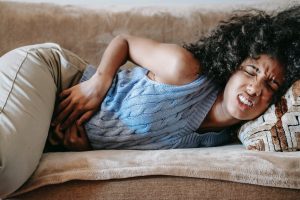“Ah don’t be whinging everyone gets period pain, you can’t be that bad, they’re normal, you’ll be grand!”
Nope, I need to emphasise period pain and heavy periods which affect your quality of life every month are common, not normal!!
So why do I have pain and my friend Sarah fly’s through her period with no effect on life whatsoever?
Short answer is Hormone Imbalance, nutrient deficiencies and or/Inflammation.
So, let’s discuss what’s going on and how you can help yourself.
Excess oestrogen: Oestrogen is produced by the ovaries, sent to its target areas and when its job is done, we get rid of it through a 3 phase detoxification programme. This involves steps in the liver and the bowels. Sluggish liver or not going to the toilet regularly can all cause oestrogen to build up. Oestrogen is responsible for that thickening in the lining of the womb in which we talked about in the luteal phase in the last blog. This thickening is what leads to how heavy your period will be, so excess oestrogen leads to extra thickening which leads to a heavier period. Clotty periods can also indicate an imbalance in oestrogen levels.
The Diet
Firstly, adequate intake of fibre, through fruit, veg and foods like lentils and pulses along with drinking enough water and getting sufficient exercise all help the bowels work regularly meaning we get rid of that unwanted oestrogen efficiently. A probiotic supplement can also be useful here for those who suffer with constipation as a constipated system is just not going to help in hormonal balance. Magnesium can also help by drawing water into the colon and relaxing it helping things here too, and it also helps with phase 2 detoxification, a complex phase which I won’t get into but basically one that needs B vitamins and zinc to function so make sure you’re getting enough of these in your diet or supplementing. Phase 1 detoxification loves broccoli, cauliflower and cabbage all to support it down to a compound called Indole 3 Carbinol. This can be found in a supplement form also, or in its most absorbable form DIM. Broccoli sprouts also help with this phase down to a magical ingredient called sulphorophane. These are actually an easy thing to get into and the benefits of sulphorophane are endless. Avoiding oestrogen exposure through things called xenoestrogens found in plastics, pesticides and switching to natural skin and body care is also a massive consideration in excess oestrogen.
Low progesterone
Low progesterone can lead to an imbalance in the ratio of oestrogen to progesterone again leading to the excess in oestrogen. Our body uses the same ingredients, shall we say, to make the stress hormone cortisol as it does to make progesterone so a stressed-out person can sometimes be causing their body to be low in progesterone. Progesterone is made by the corpus luteum at ovulation. Magnesium and vitamin B6 are especially important for progesterone and the herb vitex or agnus castus can be very helpful as it naturally increases progesterone levels in the body. No ovulation=No Progesterone and if your body is in a chronically stressed state it will try its upmost to stop you from getting pregnant.
Prostoglandins
The body makes these chemical messengers in the luteal phase of the cycle. These are inflammatory messengers and cause contractions in the lining of the uterus. The more of them are made, the more contractions we get and the more pain. Ever notice you poop a bit more during your period? This is down to prostaglandins leaning on the bowel causing contractions and moving things along. Prostoglandins increase from excess inflammation in the body. This comes from a diet high in omega 6 fats, sugar, processed food and/or food intolerances. Omega 3 found in fish helps downregulate the inflammatory effects of omega 6 so supplementing with an omega 3 fish oil can bring great improvements here. Magnesium also helps with muscle contraction by relaxing muscles and has shown massive improvements for pain.
Iron Deficiency
As we know we lose iron through blood so a risk of becoming iron deficient is also a consideration for women around our period. This works in a full circle manner as heavy periods can lead to an excess loss of iron and low iron can lead to heavy periods so its always worth while getting these levels checked every few months and upping foods that contain iron in the days coming up to your period.
Recommendations to manage your period
So what are the take home recommendations to help with period pain and/or heavy periods?
• Manage inflammation: Eat a healthy balanced diet and consider an Omega 3 fish oil and magnesium.
• Support oestrogen detox: Cruciferous vegetables, Brocolli Sprouts, Plenty of fibre, limit alcohol and exposure to xenoestrogens, along with a zinc and b complex supplement.
• Support progesterone: Magnesium and B6 in particular, manage stress and perhaps supplement with agnus castus.
• Watch for iron deficiency, increase iron rich foods in days coming up to period. Taken with vitamin C rich foods can help your body absorb better.
